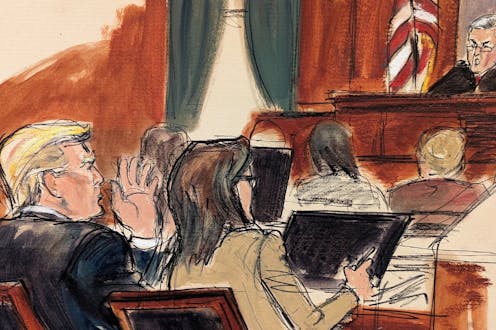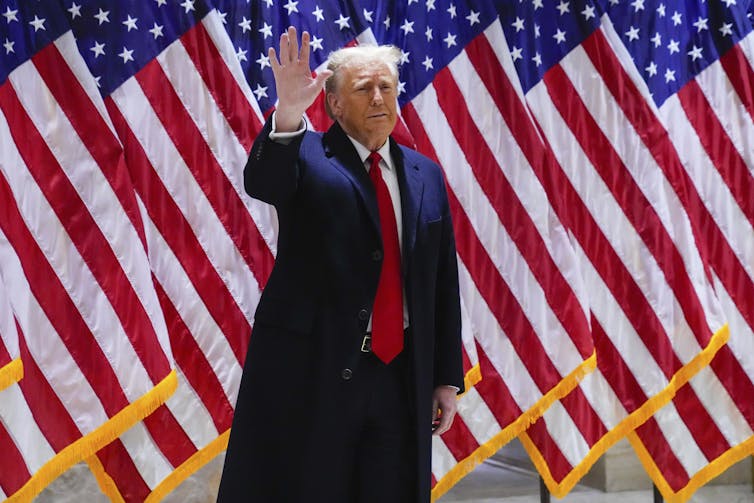‘Strife in the courtroom’ − a former federal judge discusses Trump’s second trial for defaming E. Je
A retired federal judge sheds light on what’s going on in Judge Lewis Kaplan’s courtroom during the latest trial involving former President Donald Trump.

Former President Donald Trump is in court again, this time in his second trial for defamation of writer E. Jean Carroll. In the first trial, which ended in May 2023, a federal jury found Trump had “sexually abused” her and defamed her when he denied her allegations and ordered him to pay US$5 million in damages. A jury in this trial will determine whether he needs to pay more for additional defamation, and how much.
U.S. District Judge Lewis Kaplan has spoken to both Trump and Alina Habba, Trump’s chief lawyer in this case, about their conduct in the courtroom – Trump for speaking out loudly from the defense table and Habba for apparently disregarding general principles of practicing law.
To understand more about what’s going on in this courtroom, The Conversation U.S. spoke with John E. Jones III, the president of Dickinson College, who is a retired federal judge appointed by President George W. Bush and confirmed unanimously by the U.S. Senate in 2002.
How does a judge handle either lawyers or defendants who don’t know or don’t follow the rules?
Typically in civil cases you wouldn’t see the client acting out. That’s anomalous. Generally, the client adheres to the instructions that the court and their attorney give. One of the worst things any litigant can do when there’s a jury in the box is speaking out loudly – not even a stage whisper but actually speaking out and talking directly to the judge.
Most judges find that pretty intolerable, because when somebody’s represented by counsel, they’re not supposed to be addressing the judge directly – and certainly not making statements that are not under oath that the jury can hear, as is happening in New York.
What you want as the presiding judge is for the trial to unfold in a way that’s fair. You’re on edge all the time as the judge trying to guard the record. When you’ve got a defendant who’s talking back to you, and an attorney who’s not listening, intentionally or otherwise, and blowing through all the guidance that you’re trying to give her, it’s headache-inducing for the judge.
How does the fact that one of the parties in this case is an extremely prominent political candidate play into the judge’s mindset?
I had the occasion to have a couple of elected officials in Pennsylvania in criminal cases in front of me. It’s a curiosity when you first see it, but for a practiced trial judge like Judge Kaplan – I hate to say it this way – but Trump just becomes another difficult litigant.
Kaplan is aware of the fact that it’s the former president of the United States. He can see the Secret Service members in the courtroom, but the fact of the matter is, it’s his domain.
Trump is there as a litigant, not as the former president. All persons stand equally before the law. That’s not an empty phrase. Kaplan has to do his best to make sure that both E. Jean Carroll and Trump get an even shake in court, despite the fact that, frankly, Trump may be annoying the hell out of Kaplan. You just have to go with it.

What do you think about the exchange where Kaplan said he might have to throw Trump out of the courtroom, and acknowledged Trump would probably like that, and Trump said, “I would love it”?
That was a telling comment by Trump. I never had a civil litigant that was that difficult. It’s unusual. I did have criminal litigants who would talk back, talk over me, create havoc and chaos. Of course Kaplan has admonished Trump.
You can forfeit your right to be present, whether it’s a criminal or civil case. What I’m impressed by is that Kaplan hasn’t pulled the trigger. Some judges would have a shorter fuse, and they’d take the bait.
The MAGA world, I think, would love to see him get tossed by a federal judge and would think that means he’s standing up to this judge and asserting himself. He martyrs himself by getting thrown out of court. I think that’s the last thing that Kaplan wants to do.
Overall, what are your general thoughts about this case?
It’s going to be very interesting to see where this jury comes down. If my experience holds fast and is instructive, they are not looking favorably on Habba. It’s not just Trump, it’s also Habba.
Juries generally feel connected to the trial judge. The trial judge is their friend, is their keeper, is the person who sends them out to the jury room, who gives them instructions, who greets them every day, who communicates. Most trial judges are able to really manage juries well. They respect that juries don’t want to sit too long without a break.
Habba may be winning with Trump and making him happy because she’s such a disrupter – but I suspect that she’s alienating the jury.
When you have 14 interruptions, every one of them holds up the trial. They have a sense that Habba is doing something wrong.
The jury members typically get very uncomfortable when there’s strife in the courtroom, and that can be reflected in the verdict.
What fascinates me about the case is that on the one hand, you have Trump, who is using this as a campaign appearance and riling up his base by doing it. On the other hand, I can’t imagine he has enough insurance to cover any of this. I don’t know how liquid the guy is, but he could end up with a massive verdict against him that he’s going to have to pay.
There’s a real contradiction there: He riles up the MAGA base, but he maybe has to write a check for $50 million or $100 million. Who wants to do that? Like most things with Trump, who’s ever seen anything like this? I haven’t.
John E. Jones III does not work for, consult, own shares in or receive funding from any company or organization that would benefit from this article, and has disclosed no relevant affiliations beyond their academic appointment.
Read These Next
Why ICE’s body camera policies make the videos unlikely to improve accountability and transparency
For body cameras to function as transparency tools, wrongdoing would have to be consistently penalized,…
Honoring Colorado’s Black History requires taking the time to tell stories that make us think twice
This year marks the 150th birthday of Colorado and is a chance to examine the state’s history.
50 years ago, the Supreme Court broke campaign finance regulation
A gobsmacking amount of money is spent on federal elections in the US. The credit or blame for that…






